The Passover Story
A long time ago, in the land of Egypt, there was a ruler called Pharaoh. The Pharaoh was a very mean man, and he made all the Jews living in Egypt his slaves.
A long time ago, in the land of Egypt, there was a ruler called Pharaoh. The Pharaoh was a very mean man, and he made all the Jews living in Egypt his slaves.
To be slaves meant that the Jews had to work very, very hard and were beaten by their Egyptian masters. They worked all day under the hot sun making clay bricks to build pyramids and buildings for the Pharaoh; they worked the fields to produce food for the Egyptians; and they built houses for the Egyptians to live in. The slaves did not get paid for their work, and they could not buy toys for their children. They hardly had enough food to feed themselves. They were not free to go to wherever they wanted, or to do whatever they wanted. The Jews were very unhappy and suffered a lot.
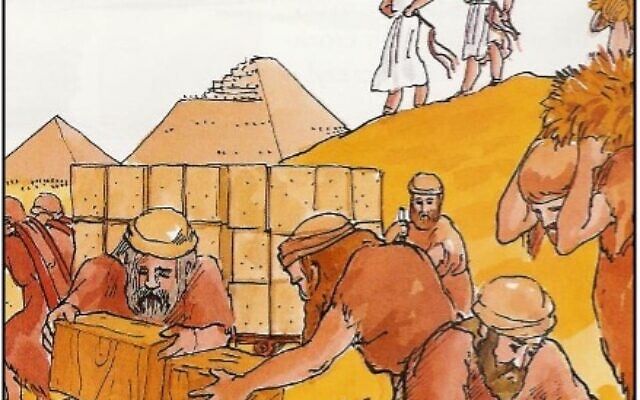 But the Pharaoh was still afraid that there were too many Jews, and decided that all the newborn Jewish boys be taken away from their mothers and be thrown into the river Nile. But one of the Jewish mothers decided to save her newborn baby boy and put him into a basket, and placed the basket into the river so that her child could live. The next day the Pharaoh’s daughter found the floating basket with the little baby-boy in it. She took the baby home to the palace where she lived, and named the baby Moses.
But the Pharaoh was still afraid that there were too many Jews, and decided that all the newborn Jewish boys be taken away from their mothers and be thrown into the river Nile. But one of the Jewish mothers decided to save her newborn baby boy and put him into a basket, and placed the basket into the river so that her child could live. The next day the Pharaoh’s daughter found the floating basket with the little baby-boy in it. She took the baby home to the palace where she lived, and named the baby Moses.
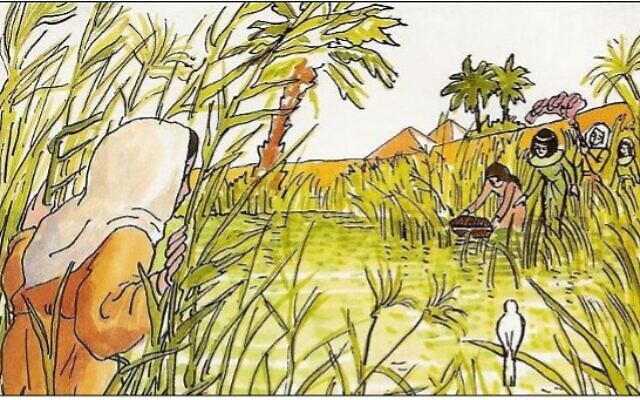 Many years went by, and Moses grew up to be a prince in Egypt, but the Jews still suffered because they were slaves. When Moses saw how much the Jews suffered, he went to the Pharaoh and asked him to free the Jews. The Pharaoh refused to listen to Moses and became angry. He made the Jews work even harder. He did not like Moses at all, and he chased Moses away from Egypt to live in another land. Moses was working as a shepherd when one day he saw a fire coming from a bush. He went to look at the fire and suddenly he heard a voice coming from the burning bush:
Many years went by, and Moses grew up to be a prince in Egypt, but the Jews still suffered because they were slaves. When Moses saw how much the Jews suffered, he went to the Pharaoh and asked him to free the Jews. The Pharaoh refused to listen to Moses and became angry. He made the Jews work even harder. He did not like Moses at all, and he chased Moses away from Egypt to live in another land. Moses was working as a shepherd when one day he saw a fire coming from a bush. He went to look at the fire and suddenly he heard a voice coming from the burning bush:
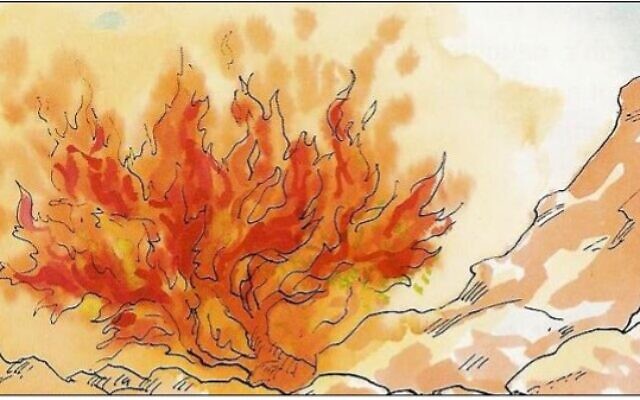 “Moses! Moses!” It was the voice of God.
“Moses! Moses!” It was the voice of God.
“I am here!” answered Moses, and he was scared because he never heard the voice of God before.
And God told Moses: “ I want you to go back to the land of Egypt and free all the Jews from slavery, and lead them back to the Promised Land, the home of the Jews!” Today we call this Promised Land Israel.
So, Moses went back to Egypt and he went to see the Pharaoh. Moses told the Pharaoh that God had commanded the Jews to leave Egypt. The Pharaoh said: “No way! I will not let the Jews go.” And instead of letting the Jews go, the Pharaoh decided to make them work even harder. But Moses warned the Pharaoh that if he did not let the Jews go, God would punish him and all the other Egyptians. But the Pharaoh just laughed and did not believe Moses.
And sure enough, God’s punishment came about in the land of Egypt:
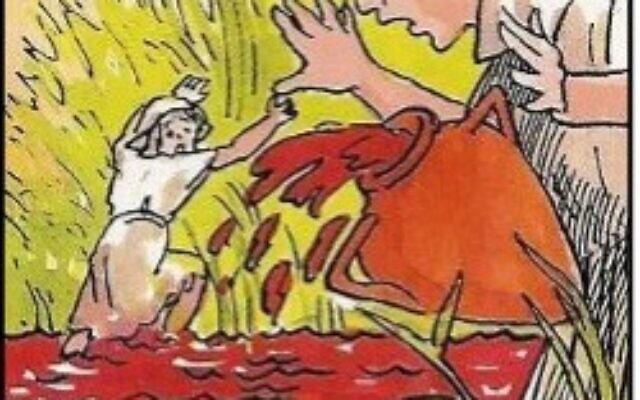 First, all the water turned to blood and the Egyptians could not drink or cook or wash.
First, all the water turned to blood and the Egyptians could not drink or cook or wash.
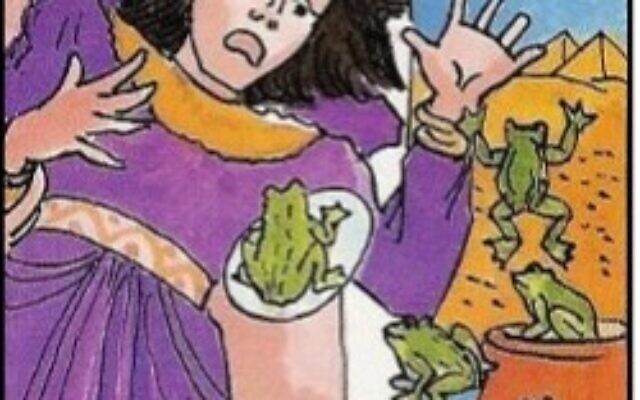 Then, frogs appeared all over in Egypt: on the tables and chairs, on dishes, in bed, on the floor; slimy frogs were everywhere. The sound of their croaking drove the Egyptians crazy!
Then, frogs appeared all over in Egypt: on the tables and chairs, on dishes, in bed, on the floor; slimy frogs were everywhere. The sound of their croaking drove the Egyptians crazy!
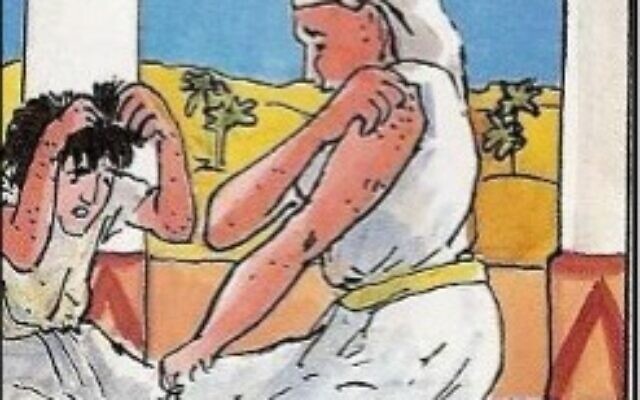 Then, there were flies and insects biting everybody. All the Egyptians became sick and sore from itching and scratching.
Then, there were flies and insects biting everybody. All the Egyptians became sick and sore from itching and scratching.
But the Pharaoh was stubborn and would not let the Jews go.
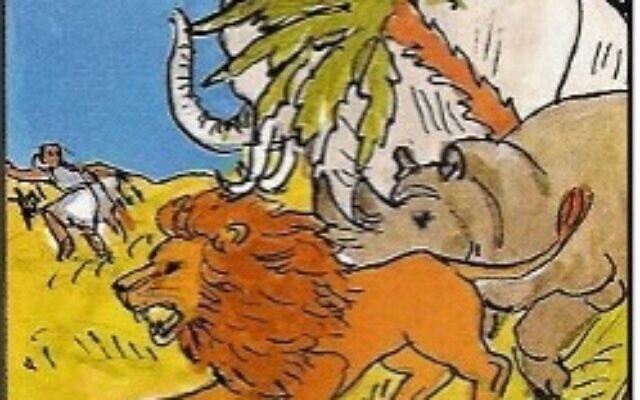 Then, hordes of wild animals, lions, elephants and hippopotamus suddenly appeared. They ran wild and destroyed everything in their path: houses, fields, and trees.
Then, hordes of wild animals, lions, elephants and hippopotamus suddenly appeared. They ran wild and destroyed everything in their path: houses, fields, and trees.
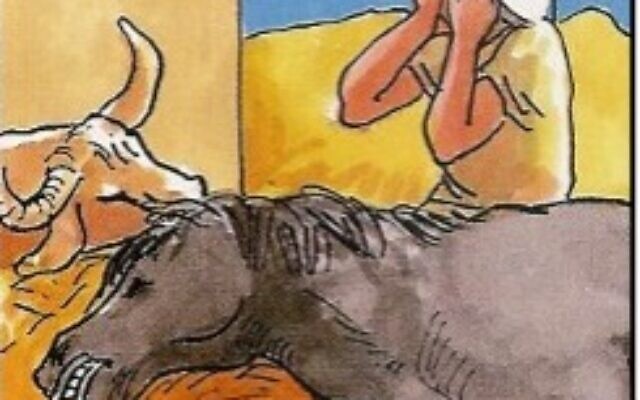 Then, all the animals of the Egyptians, their sheep and cattle, and their beautiful horses, got sick and died.
Then, all the animals of the Egyptians, their sheep and cattle, and their beautiful horses, got sick and died.
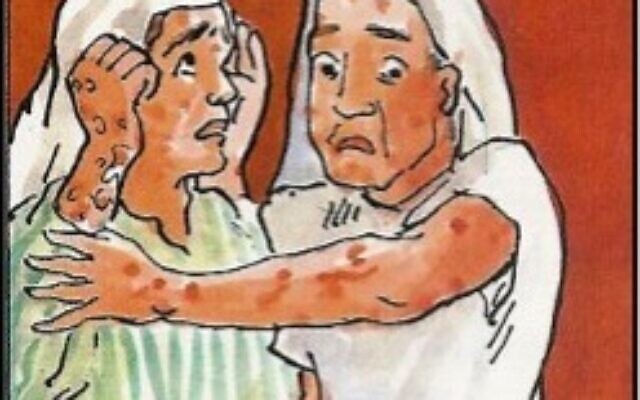 Then, every Egyptian was covered with painful blisters and boils. They couldn’t sit, couldn’t stand, and couldn’t lie down. The suffering was terrible.
Then, every Egyptian was covered with painful blisters and boils. They couldn’t sit, couldn’t stand, and couldn’t lie down. The suffering was terrible.
But the Pharaoh was still stubborn and would not let the Jews go.
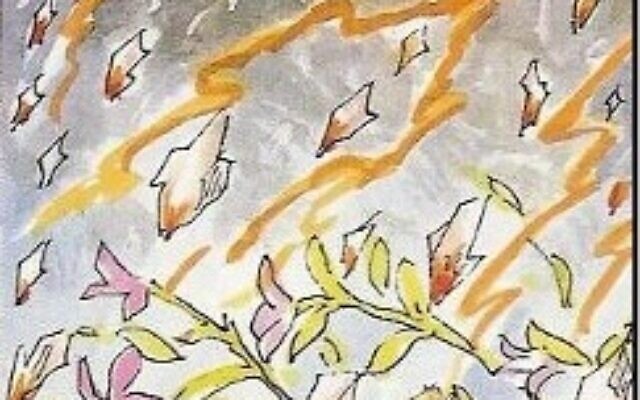 Then, a horrendous hailstorm swept across Egypt. Big pieces of ice fell from the sky destroying the flowers, the gardens and the trees.
Then, a horrendous hailstorm swept across Egypt. Big pieces of ice fell from the sky destroying the flowers, the gardens and the trees.
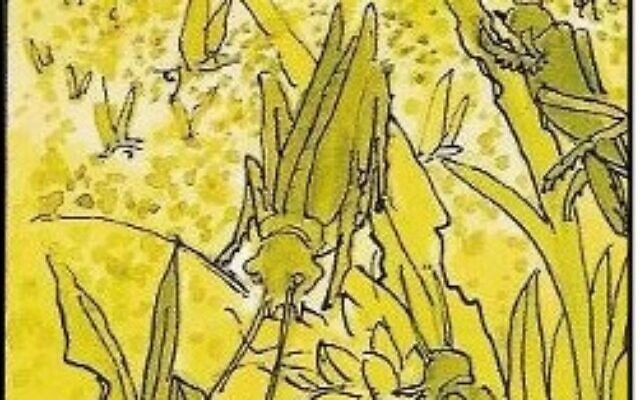 And then the locusts came – millions and millions of them, in great dark buzzing clouds. They swept across Egypt eating up all the crops and the fields.
And then the locusts came – millions and millions of them, in great dark buzzing clouds. They swept across Egypt eating up all the crops and the fields.
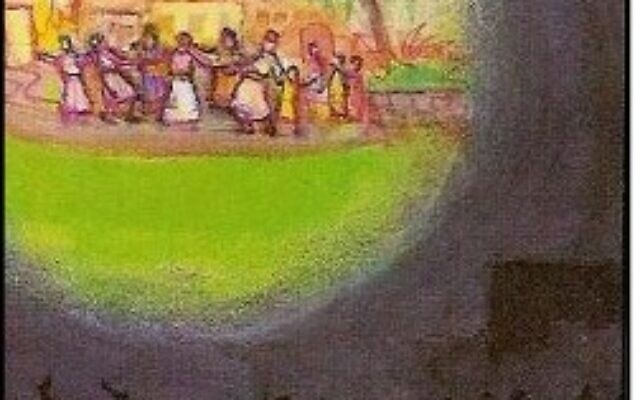 Then, there was complete darkness, even during the day; nobody could see anything. The Egyptians just sat glued to their chairs or lay trembling in their beds.
Then, there was complete darkness, even during the day; nobody could see anything. The Egyptians just sat glued to their chairs or lay trembling in their beds.
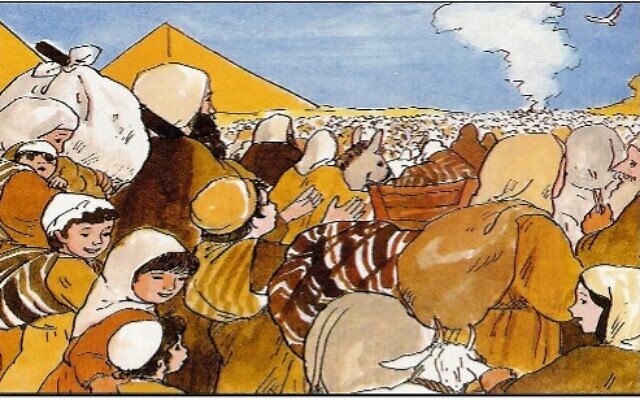 But, after all these bad things, the Pharaoh still did not want to free the Jews. Moses then warned the Pharaoh that unless he freed the Jews, the oldest son in every Egyptian family would die. And finally, the Pharaoh agreed to let the Jews go, but he ordered them to leave right away.
But, after all these bad things, the Pharaoh still did not want to free the Jews. Moses then warned the Pharaoh that unless he freed the Jews, the oldest son in every Egyptian family would die. And finally, the Pharaoh agreed to let the Jews go, but he ordered them to leave right away.
There was very little time, and the Jews had to hurry and left so quickly that they did not have time to bake any bread for the road. Instead, they ate flat bread, called matzah, as they were going through the desert. Then, as the Jews, lead by Moses, reached the Red Sea the Pharaoh changed his mind and decided to go after the Jews and make them become slaves again. And now the Jews were trapped between the Egyptian army chasing them in their chariots, and the Red Sea in front of them.
But suddenly there was a miracle. The Red Sea parted, and there was a dry path through the sea all the way across to the other side. The Jews were happy to escape the Egyptians and started to cross the Red Sea. When the Egyptians saw that the sea was parted, they too decided to cross chasing after the Jews. But as soon as the Egyptians started to cross the Red Sea, the sea closed again, and they could not reach the Jews on the other side of the sea.
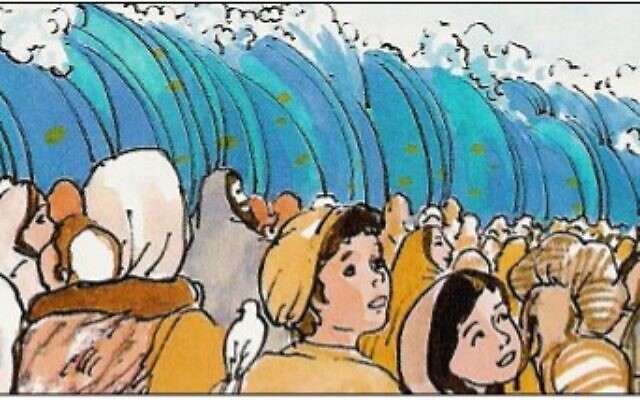 And that is how the Jews escaped from Egypt and went to the Promised Land. And this time every year, Jews all over the world celebrate this miracle, and their freedom from slavery. And this celebration is called Passover.
And that is how the Jews escaped from Egypt and went to the Promised Land. And this time every year, Jews all over the world celebrate this miracle, and their freedom from slavery. And this celebration is called Passover.
During Passover we have a feast called the Seder. We read a book, called the Haggadah, which tells the story of Passover that I just told you, so that we will always remember our history. And we put special symbols on the Seder table to remind us of what our ancestors went through many-many years ago when they escaped from Egypt:
Bitter herbs – to remind us how bitter life was for the Jewish slaves in Egypt
Salt water – to remind us of the tears of the slaves
Haroset – this mixture of apples, nuts, wine and cinnamon, to remind us of the mortar the Jews used to put the bricks together
Matzah – we eat this in memory of the flat bread the Jews had to bake in a hurry when they escaped from Egypt
Sweet herbs to remind us of the hope and freedom in the Promised Land
The lamb bone and the egg to represent spring and a new beginning.
Another thing we do at this time is to take pieces of Matzah, called Aphikomon, and hide it for the children to find it after dinner. The child that finds the missing matzah gets a present.



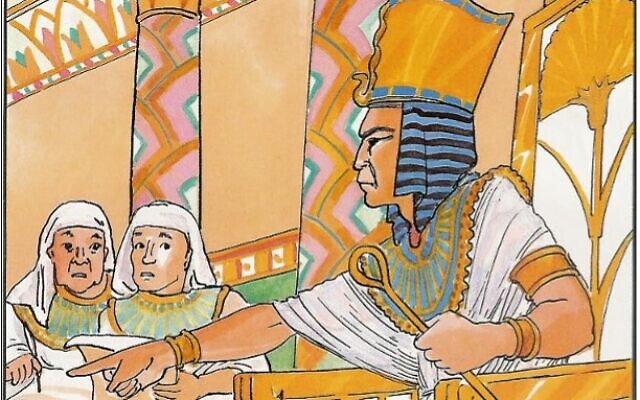
comments